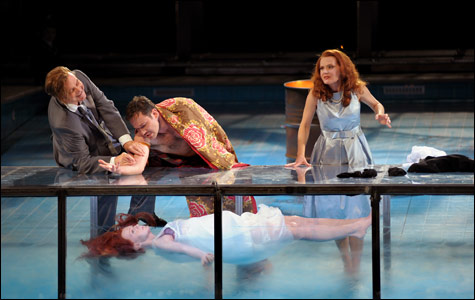
KRÓL ROGER Karol Szymanowski's homo-erotic take on Euripides's The Bacchae was a powerful if bewildering experience. |
Although I hadn't been to Paris for more than 40 years, I've found myself in the City of Light twice since Christmas. One of the most striking qualities of cultural life in Paris is how adventurous the music is. Productions I attended at the Opéra and Opéra Comique would be rare in New York, let alone Boston — though some of the performers would be familiar.
At Christmas, the musical highlight was William Christie's Les Arts Florissants doing Ferdinand Hérold's Zampa, ou la fiancée de marbre ("Zampa, or The Marble Bride") at the Opéra Comique — an opera about a heroic but villainous pirate. The rousing overture used to be an orchestral staple; Toscanini recorded it twice. But the entire 1831 score is captivating. The title role was taken by an American, Richard Troxell, who didn't impress me much when he sang Gounod's Faust with Boston Lyric Opera in 1995. I thought he was a cipher who could pump out high notes. Now he's a dashing presence, a matinee idol with a big ringing voice. "Boston Lyrical Opera" (his program credit) ought to bring him back.
The oddest musical event at Christmas was "A Tribute to Maria Callas," at the little mediæval church of Saint-Julien-le-Pauvre on the Left Bank. The poster said that the soprano, Lina Castellanza, was from La Scala. A small crowd gathered to hear her — accompanied by her husband, Herbert du Plessis — in a bunch of arias Callas had indeed sung (Verdi, Catalani, Gluck) and also several she hadn't. There was no program bio, but Mme. Castellanza must have had a powerful voice in her prime (say, 30-35 years ago), and the top notes are still there, even in an aria as demanding as Verdi's "Pace, pace, mio Dio." Callas would have given her eye teeth to have those. But Castellanza seems to have no interest in Callas's profound interpretive understanding. When I returned a few weeks ago, there were fresh posters for the Callas tribute.
This trip, the Paris Opéra was in business, and with unusual repertoire. At the vast, streamlined Opéra Bastille, there was Karol Szymanowski's 1926 Król Roger ("King Roger"), his gorgeous and moving homo-erotic take on Euripides's The Bacchae, with King Roger having to deal with the power of a renegade shepherd (Dionysus in disguise) to seduce everyone (including the queen) in his path. The Shepherd was tenor Eric Cutler, who made a solid impression as Nemorino in BLO's L'elisir d'amore last year and an even better one as Iopas in the BSO's Les Troyens, singing one of Berlioz's most ravishing arias. No question about his vocal power and command of the stage. Too bad his apotheosis took the form of burying his face in a Mickey Mouse head.
The controversial production was by the Polish avant-garde director Krzysztof Warlikowski, evidently a favorite of Paris Opéra general director Gérard Mortier (who has produced an impressive list of modern works) but not of the audience. He was vociferously booed at the curtain call. Yet the dream-like swimming-pool set and endless mirrors seemed to fit the "irreality" of the libretto, and the performances were so intense that, despite the foolishness, one left having gone through a powerful if bewildering experience. No nudity, which was odd in an opera notorious for it.